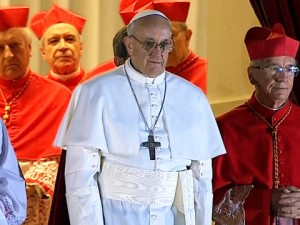 This Saturday Pope Francis called for a day of fasting and prayer for peace, especially for the rapidly escalating (or deteriorating) situation in Syria. Since these days are so seldom proclaimed, they present us a great opportunity to examine fasting in greater detail. In todays age where fasting and penance are almost non-existent (sadly enough this is especially the case in most pulpits in our Church), we have a chance to partake in a great blessing.
This Saturday Pope Francis called for a day of fasting and prayer for peace, especially for the rapidly escalating (or deteriorating) situation in Syria. Since these days are so seldom proclaimed, they present us a great opportunity to examine fasting in greater detail. In todays age where fasting and penance are almost non-existent (sadly enough this is especially the case in most pulpits in our Church), we have a chance to partake in a great blessing.
Nowadays people tend to have a very mechanical view of fasting. Person A fasts, and receives intention B from their respective Deity. Indeed, this is how the secular press is portraying it. They are portraying it as Catholics will fast so that America won’t invade Syria. We should really hope that our country doesn’t, no matter our views on the current conflict, but that isn’t the reason from a Biblical standpoint, or from the texts of Francis’ remarks.
In the Bible, the point of fasting is always on spurring us to action. When Ezra proclaims a fast, it is so we can “ask of God a right way.” (Ezra 8:21) In the Old Testament, the heroic women Judith (Judith Chapter 8) and Esther (Esther 4:16) undertook actions of heroic virtue on behalf of God’s people after fasts had been proclaimed. The prophet Isaiah views the rather extreme fasts the Israelites carried out as damaging to the soul, since the actions which sprang from the fasts were sinful, instead of being driven to carry out works of mercy. (Is 58:6) When Our Blessed Lord fasted, it was because he was about to embark on his public ministry.
What does fasting have to do with any of this? There is a natural and a supernatural dimension to our reasons for fasting. On the natural side, fasting is a great way to build discipline. Building a culture of peace is hard work. If you can’t keep your emotions in check over a burger, you aren’t going to keep them in check when that jerk insults you. The hope is that by mastering your sensual appetites, you can take the hard steps required to live out the Gospel. Or to paraphrase God’s statement to Jeremiah “If you lack the discipline to not eat a burger, how can you have the discipline to dedicate your life to justice which is inherently messy and difficult?” (Jeremiah 12:5)
That is the reasoning most are familiar with when it comes to fasting, but there is another reason for fasting which is just as important. The supernatural case for fasting is first a recognition that all good things come from God, especially the intention for which we are fasting. We cannot find the strength needed to do things from the products of the earth, but only from the God “for whom we were made, and to whom we must return.” (Leo XIII, Libertas) Fasting is our way of returning to God and letting Him show us the way to our goals.
When one reads the Holy Father proclaiming this fast, one sees a lot of these themes. He begins by quoting John XXIII in Pacem in Terris which stresses the importance of individuals building up a culture of peace. While he calls for nation states to pursue peace, he spends the majority of his address appealing to individuals to build the conditions necessary for peace. It is a classic distrust of the instutions of man which comes from being thoroughly familiar with the Scriptures and human nature. In order to have any true lasting peace, there must be a culture of peace adopted by individuals throughout the world.
I hope everyone who reads this column engages in the fasting. Even if you favor military action in Syria, one cannot be so hard of heart to believe that war is a great thing, or that we shouldn’t spend time encouraging peace. Take this Saturday not to argue political positions, but to re-dedicate yourself to the cause of building an authentic culture of peace, and pray that the wounded hearts in Syria can either be comforted by that peace or converted to it.
Further Reading:



